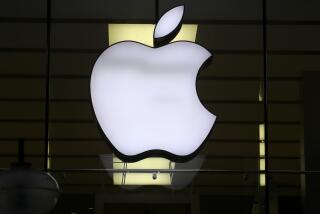Price cut stirs iPhone questions
- Share via
SAN FRANCISCO — Is the iPhone at risk of becoming an iFlop?
Apple Inc. slashed the price of its high-end iPhone by $200 Wednesday, sparking investor concerns that sales had stagnated since the gadget’s much-hyped launch only two months ago.
Apple’s shares fell more than 5% to $136.76.
But Chief Executive Steve Jobs said Apple was merely stepping up the pressure on its wireless competitors, using the price cut to try to “put iPhones in a lot of stockings this holiday season.”
Jobs said the 8-gigabyte iPhone would cost $399, down from $599. He also announced plans to phase out the 4-gigabyte version, which analysts took as a sign that the model wasn’t selling well.
“It’s Christmas in September for people who don’t have iPhones,” said Samir Bhavnani, research director at Current Analysis West, a research group based in San Diego. “But it could indicate that sales are flat.”
Despite the price cut, Jobs didn’t raise his iPhone sales forecast. He said the company remained on track to sell its millionth iPhone, which combines a cellphone, Internet device and digital entertainment player, by the end of this month.
Apple has said it expected to sell 10 million iPhones by 2008 -- about as many iPods as it sold in the last quarter alone.
At a media event at the Moscone Center in downtown San Francisco, Jobs also unveiled an iPod that connects to wireless networks. The iPod Touch is a touch-screen device that lets anyone in range of a Wi-Fi hot spot buy music or surf the Web. The version with 8 gigabytes of storage will cost $299 and the 16-gigabyte version $399.
Taken together, the iPhone price cut and the new iPod offered strong signs of the company’s growing ambition to tackle the wireless market.
“Apple wants to be more of a legitimate player in the mobile market than people thought,” said Gene Munster, senior research analyst for Piper Jaffray. The price cut “will hurt them in profitability for the first few quarters, but it will boost the demand for the iPhone.”
Apple is expanding the consumer market for hand-held devices that allow Web browsing on the go, said John Spooner, senior analyst at Technology Business Research in Hampton, N.H.
The new iPod “significantly increases Apple’s reach,” he said.
Even before the iPhone launched on June 29, critics said it was too expensive, especially with cellphone prices dropping.
Apple analysts said a price cut had been inevitable and could open the door for Apple to introduce a 16-gigabyte version of the iPhone for the holidays at a higher price.
Still, the size of the price cut surprised some consumers -- and frustrated others, especially those who waited in line for hours to buy a $599 phone this summer.
“I knew it would come down in price like a computer,” said Chris Ontiveros, a 28-year-old contractor in Salinas, Calif., who bought an iPhone the first hour it went on sale. “I didn’t know it would be this much. I am very unhappy. I would have waited.”
David Jackson, 51, an engineer in Santa Clara, also was surprised. But he said he didn’t regret spending an extra $200 because he enjoyed using the iPhone for the last two months.
He said Wednesday’s price drop meant one thing: “My kids will be getting iPhones for Christmas.”
Apple also showed off a slew of other music and video products and services. Next week, iPhone users will be able to buy ring tones from iTunes. Jobs said iPhone owners could choose among 500,000 songs, buy one for 99 cents and spend an extra 99 cents to use the music for a ring tone.
Like iPod Touch owners, iPhone users soon will be able to buy music from iTunes directly from the Internet, rather than having to first download songs to home computers and then sync to the device.
The move was a response to competitors that let people download songs to their devices, analysts said.
Apple also introduced video iPod Nanos, which will be available later this week. The new Nanos come in a 4-gigabyte version at $149 and an 8-gigabyte version at $199.
Additionally, Apple announced a partnership with coffee giant Starbucks Corp. If a song catches their interest while they sip coffee in a Starbucks, people can look at iTunes on their iPhones or iPod Touch devices to identify the music playing and buy it. They can do the same through iTunes on their Mac or PC notebooks.
“One of the most-asked questions in Starbucks today is, ‘What song am I listening to?’ ” Starbucks Chairman Howard Schultz said at the event with Jobs.
The service will begin Oct. 2 in Seattle and New York, then spread to other cities. It will reach Los Angeles in February.
The announcements came after a week of speculation about Apple’s plans. Rumors such as Apple adding the Beatles’ catalog to iTunes and the introduction of a Nano phone had pushed up the stock.






